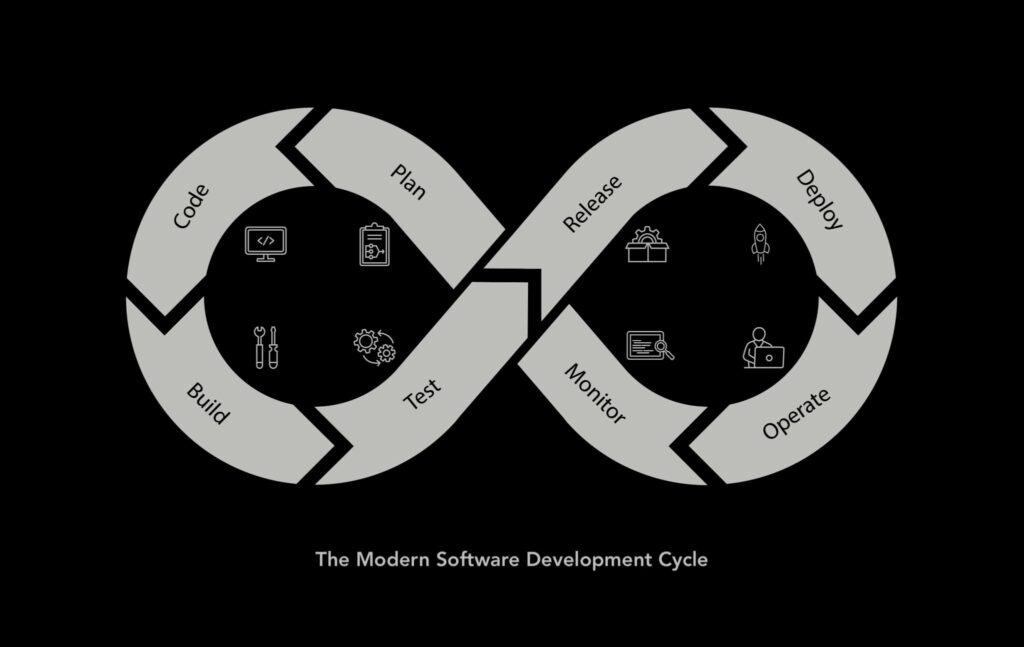When it comes to DevOps, CI/CD is widely consisted standard—and best—practice. In turn, CI/CD Tools are a must-have. But what exactly are they? And what are the most popular CI/CD Tools we see in use by the Sofy community? Let’s take a look.
Yet before we begin, please note: This list is not an endorsement of any product and it is not sponsored by any company. We’ve simply found these use patterns interesting and relevant to what we do here at Sofy—and we think you might also find them of interest.
What are CI/CD Tools?
CI/CD (Continuous Integration and Continuous Deployment) forms the foundation of the modern DevOps pipeline, allowing developers to make reliable and—crucially—frequent small or large code changes. Eliminating much of the drudgery of yesteryear, this automation-focused pipeline is today standard for dev teams due to its fundamental emphasis on efficiency and flexibility, allowing teams operating under tight deadlines to maintain a healthy development schedule.
Fortunately, the days of being cast down in to merge hell are all but behind us, and there are many platform options out there in the CI/CD world today. Yet with so many aspects of the DevOps world, the CI/CD landscape is constantly shifting. Here at Sofy, we see a lot of CI/CD platforms used within the Sofy orbit, and so we’ve decided to compile a list of some of the most common CI/CD platforms we encounter in use by the Sofy community.
CI/CD platforms generally support a wide variety of coding languages, but for specifics on each and many platforms listed align with Microsoft’s GitHub, Atlassian’s Bitbucket, BIZX’s SourceForge, and GitLab, operated by GitLab Inc. Of course, before making any concrete decisions on what platform may be best for you or your team, we strongly encourage you to research each option by way of the links we provide below.

Popular CI/CD Tools
So, in no particular order, here are the most popular CI/CD tools we see in use by the Sofy community:
1. Jenkins
One of the best-known and oldest CI/CD platforms on this list (and easily recognizable by its classic butler mascot), Jenkins is an extremely flexible platform that benefits from an especially active and robust community. Many of Jenkins’s advantages (and its popularity) stem from its status as an open-source platform, allowing its users to orchestrate either a highly complex or simple pipeline.
Jenkins offers its users a tremendous number of open-source plugins, a major feature that makes Jenkins stand out strongly from many other CI/CD platforms, making Jenkins a particularly attractive option for enterprise users. On the down side, users new to CI/CD may encounter difficulty with approaching this platform. Jenkins was created in 2004 by engineer Kohsuke Kawaguchi (at which time it was known as Hudson).
2. Bitrise
Bitrise stands out among the entries in our list in that it focuses specifically on Mobile DevOps. As Bitrise puts it, Mobile is unique. As such, it deserves and requires an approach that differs from traditional DevOps methods. As an automated mobile app testing platform company, we here at Sofy certainly understand! Given the incredible amount of emphasis placed on mobile apps today and the ever-growing market for all things mobile, this makes Bitrise a particularly attractive option for mobile app development teams. Bitrise was founded in 2014 and is based in Budapest, Hungary.
3. Azure Pipelines
A component of Redmond-based Microsoft’s Azure DevOps Services, Azure Pipelines is one of the most common CI/CD platforms we see in use by the Sofy community. As you might expect, Azure Pipelines offers seamless integration with Microsoft Windows systems and GitHub (Microsoft acquired GitHub in 2018). However, to use Azure Pipelines, you must have access to Azure DevOps Services. For more information on Azure Pipelines, see more information from Microsoft here.
4. AppCenter
The second Microsoft CI/CD platform on our list, AppCenter differs from Microsoft’s Azure Pipelines in that, generally speaking, Azure Pipelines offers support for more complex processes and the deployment of several services and apps at once. In comparison, App Center provides a simpler, more streamlined approach for users. In short, if you don’t need the bells and whistles of Azure Pipelines, App Center may be the better choice for your team.
5. GitHub Actions
CI/CD platforms commonly integrate well with GitHub, GitHub Actions—as its name implies—is as closely integrated with GitHub as one can imagine. However, its greatest benefit is probably also its greatest issue: As GitHub puts it, GitHub Actions is a CI/CD tool for the GitHub flow and, in response to the question of why is having a GitHub-native CI/CD helpful?, GitHub states: The most basic answer is simplicity—if you’re already hosting a project on GitHub, you have a built-in CI/CD tool that works right alongside your code.
In turn, don’t expect much utility exterior to GitHub-specific CI/CD flows, but given the central role that GitHub plays for so many teams today, for most DevOps teams, such a restriction won’t be a major issue. For more information on GitHub Actions, see the platform’s website here.
6. GitLab
At first glance, readers new to CI/CD may confuse GitLab’s CI/CD capabilities with GitHub Actions (look for a sleek orange fox head logo rather than the famous Octocat!), but the similarity is simply due to their common origins in Git, free open-source software first released in 2005 by Linux creator Linus Torvalds. Git has since come to play a major role in modern software development.
Like GitHub Actions for GitHub, GitLab provides CI/CD support specifically for GitLab, and provides an excellent interface along the way. If you are focused specifically on GitLab over GitHub, then GitLab’s native CI/CD platform is the clear choice.
7. Circle CI
Launched in 2011 and based in San Francisco, CircleCI has since become a popular CI/CD platform among DevOps professionals. According to the platform, Circle CI strives to not [be] your average CI/CD, and the platform places a strong emphasis on factors such as security that has proven particularly attractive to larger organizations, as the CircleCI’s list of clients makes clear. On the downside, CircleCI offers fewer customization options than some other CI/CD platforms on this list, and many users may find CircleCI difficult to approach in comparison to many of the other CI/CD platforms we include on this list.
8. Travis CI
Immediately recognizable by its hard hat and red mustache-wearing logo, Travis CI owes much of its popularity to the fact this this popular CI/CD platform places a strong emphasis on simplicity. In turn, Travis CI has proven especially appealing to newcomers to testing alongside more experienced teams that need a straightforward test completed quickly. The platform offers a variety of plans, including a trial. Founded in Germany in 2011, CI is today owned by Houston-based Idera, Inc.
9. Stormkit
The first line of Stormkit’s mission statement is that the company aims to simplify and automate complex processes over the entire life cycle of a Javascript application and that’s exactly what this CI/CD platform does: Stormkit uniquely focuses on Javascript, making it an attractive option for developers working with Javascript applications. Stormkit has taken a particularly strong community-focused feature development approach, constantly tapping the platform’s community for their requests and feedback, which has played a major role in its popularity to date.
Sofy and CI/CD Platforms
Whatever CI/CD platform you choose, Sofy is here for you. We know that testing is a crucial component of the DevOps pipeline (and software development more generally). That’s why Sofy’s no-code automated approach cuts your testing time down to a fraction. And this way you can focus on other aspects of the development cycle.







